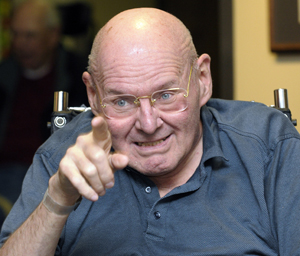
GREENFIELD — Carmelite Fr. Reginald Foster is a popular figure wherever he goes – from the halls of the Vatican to his temporary home at Clement Manor.
What might have been expected to be a quiet Saturday afternoon recently, for instance, was marked by a visit from a niece and grand-niece whom he had not seen in 23 years; a chat with a couple he married 28 years ago; and quick greetings from a fellow priest who lives at the sprawling facility.
“This has been an enriching experience,” said Fr. Foster, who has lived here since April.
Fr. Foster was raised in Milwaukee but now considers Rome to be his home, having lived there for the past 47 years. He serves in the Vatican’s Latin Language Department and heads a Latin academy that aims to keep the language alive for seminarians, priests and lay people.
Currently, however, Fr. Foster is on hiatus (a word rooted in the Latin hiare, “to gape”) while he recovers from a series of medical problems. This is the second stay in two years at Clement Manor for Fr. Foster, who turns 70 next month.
Like many seniors in a rehabilitation environment, Fr. Foster wishes his recovery would move more quickly so he can return to his home and activities. He receives about 2.5 hours of physical and occupational therapy each weekday – “not enough, as far as I’m concerned” – and ongoing attention to matters such as nutrition.
“For many people, this would be discouraging,” said Dr. Mary Cohan, medical director at Clement Manor and Fr. Foster’s personal physician. “He has always tried and kept on trying.”
Fr. Foster, known for his strict teaching style, reveals a softer side, saying his eyes have been opened at Clement Manor as he observes not only the aging process but also interpersonal relationships.
“You learn tolerance,” he said. “You see some old people who are jovial, but there are some who are crabby and mad at the world. In that sense, it’s been very rewarding.”
Sometimes, he said, employees bring their personal problems to him for advice or simply a listening ear. “You don’t have to be in a stole” to carry out priestly duties, he noted.
Lori Schultz, a physical therapy assistant, said Fr. Foster “always has us laughing” and is tuned in to the moods of other residents and employees.
“One day, we (staffers) were having kind of a bad day, and he said, ‘You know, life is so important you can’t waste even one day being upset,’” she recalled.
While Clement Manor offers many activities, Fr. Foster mostly stays on the sidelines. He enjoys watching The History Channel and TV programs about animals.
“I tried bingo once but played only half a game,” he said. “If I were here permanently, I’d get interested in the activities, the senior citizen stuff.”
Dr. Cohan is hoping to have Fr. Foster speak at the Medical College of Wisconsin on the Latin origins of medical terminology. Students and physicians have expressed an interest in attending a presentation, once it can be scheduled, she said.
“He has impacted all the physicians he has met and all the people who have cared for him,” said Dr. Cohan, a Catholic. “His faith runs deep.”
Fr. Foster has been able to keep up on some of his work during his rehab, such as giving the once-over to the translation of Pope Benedict XVI’s recent encyclical, “Charity in Truth.”
“They sent me the whole packet – 130 pages – and said, ‘Will you read it, go through it?’” explained Fr. Foster. “I spent a few days and a couple beers doing that.”
He also created a Web cast for his Latin students, sparking a series of get-well wishes from spots all over the globe.
“They were saying, ‘We can’t wait for you to be back,’” said Fr. Foster. “A teacher hears that and just melts.”
In Rome, Fr. Foster spends his mornings in his office down the hall from the papal apartments, then teaches at his academy until 5:30 p.m. Evening prayer at the monastery where he lives is followed by dinner at 8:30. His personal time is spent in quiet activities such as writing, reading and listening to classical music; he owns more than 300 CDs.
“I do have a solitary life – the reason I became a Carmelite is exactly that,” he said. “I need the solitude as a powerhouse. Otherwise, I would dry up.
“Some people have to have a lot of noise. I can be with students or in the Piazza Venezia, and then go home and turn it off. I’ve learned to mix the two very nicely.”
Fr. Foster is eligible to retire, but is being encouraged by his superiors to return to work.
“They said, ‘Take it easy, and when you can return it will be soon enough,’” he said.
Dr. Cohan said her goal is to have Fr. Foster well enough to use a walker when he returns to Rome, perhaps in time to teach summer school. That would be a big improvement, considering that he arrived in April by stretcher, taking up the space of nine seats on an Alitalia flight.
For about three months last year, Fr. Foster lived at Clement Manor during treatment for a broken femur and a puzzling infection. Early this year, the infection returned, creating painful open sores on his legs and likely settling in his heart. He was in a state similar to a coma for about six weeks and went into cardiac arrest twice; he later underwent a five-hour open-heart surgery.
“They started digging a hole for me at Holy Hill,” quipped Fr. Foster. “My doctor said, ‘No, we’re not going to give up.’ I was given last rites and right away started getting better.”
